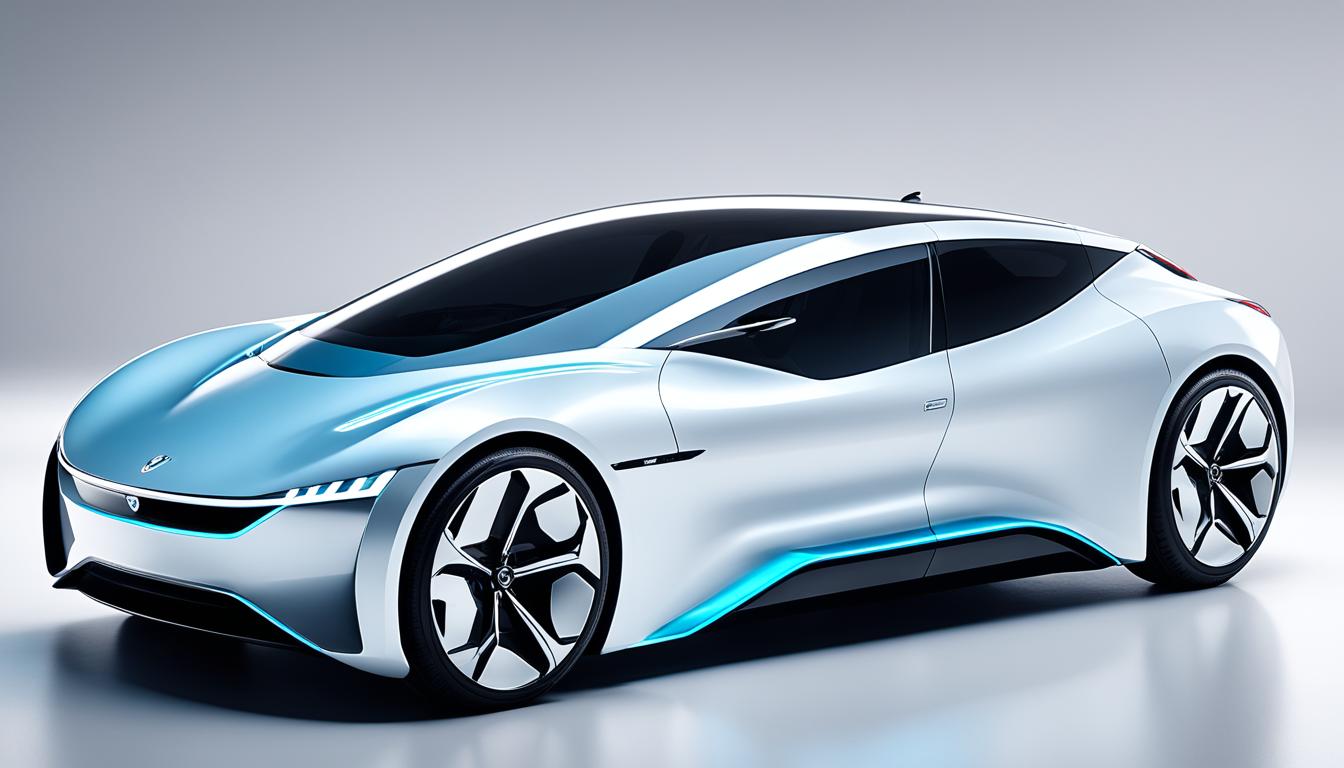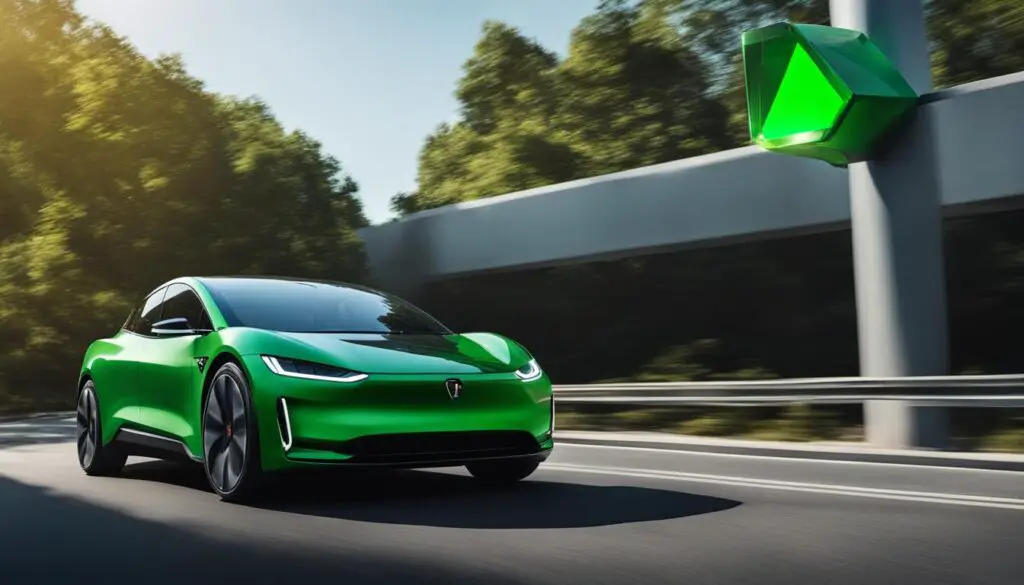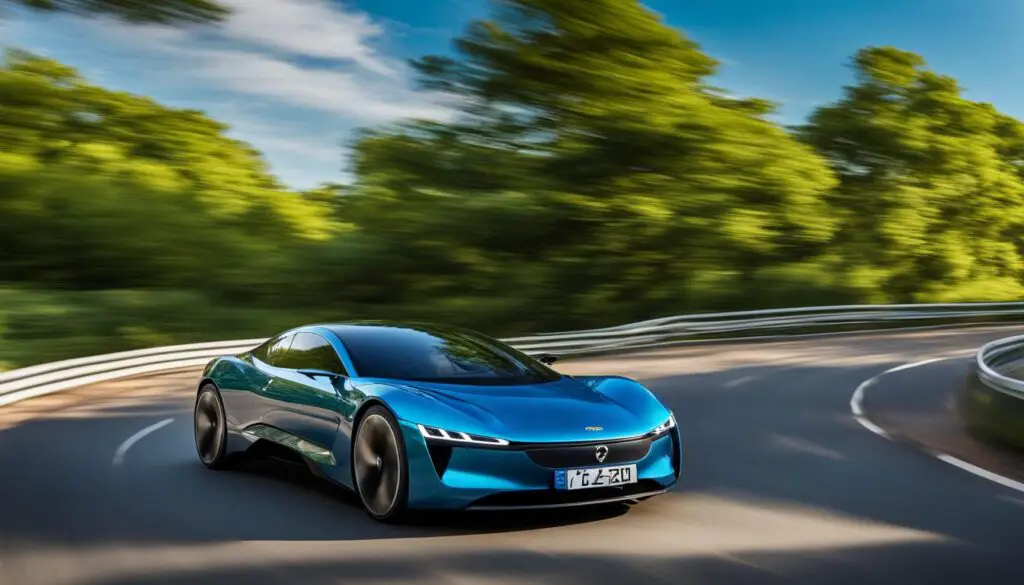
Innovative Electric Vehicle Design Trends for the Next Decade
Electric vehicle design is undergoing rapid evolution, paving the way for innovative trends that will shape the future of mobility in the next decade. With a focus on safety, efficiency, and sustainability, these advancements are set to revolutionize transportation and transform the way we travel.
As the demand for electric vehicles continues to rise, automakers and designers are pushing the boundaries to create cutting-edge designs that offer enhanced performance, improved range, and enhanced user experience. From sleek and aerodynamic exteriors to futuristic interiors, electric vehicle design is becoming synonymous with innovation and cutting-edge technology.
Key Takeaways:
- Electric vehicle design is evolving rapidly, with a focus on safety, efficiency, and sustainability.
- Advancements in design aim to revolutionize transportation and transform the way we travel.
- Innovative electric vehicle designs offer enhanced performance, improved range, and futuristic user experiences.
- Automakers are pushing the boundaries to create cutting-edge, sleek, and aerodynamic electric vehicle exteriors.
- Electric vehicle interiors are becoming more futuristic, incorporating advanced technologies for enhanced user experience.
Safety and Fire Prevention in Electric Vehicle Design
Safety is a paramount concern in the design of electric vehicles, and fire prevention is of particular importance. While there have been concerns about battery fires in electric vehicles, studies have shown that they are actually less likely to occur compared to combustion car fires. According to data from the Swedish Civil Contingencies Agency (MSB), there were only 23 reported electric vehicle fires out of a total of 611,000 electric vehicles in 2022. This makes the incidence of battery fires in electric vehicles 20 times less likely than regular car fires.
Electric vehicle manufacturers are fully aware of the importance of safety and have made it a top priority in their design process. They incorporate advanced technologies and safety features to minimize the risk of fire. These safety measures include reinforced battery enclosures, thermal management systems, advanced fire suppression systems, and rigorous testing procedures.
In fact, electric vehicles undergo extensive testing to ensure their safety under a wide range of conditions. They are subjected to various simulations and crash tests to evaluate their resistance to impact and assess the potential risks associated with battery fires. Electric vehicle manufacturers work closely with regulatory bodies to establish safety standards and compliance requirements to ensure that their vehicles meet the highest safety standards.
Furthermore, electric vehicles benefit from their unique design characteristics that reduce the likelihood of fires. The design of electric vehicle batteries, with their individual cell packaging and monitoring systems, minimizes the risk of thermal runaway and potential fire hazards. Additionally, electric vehicles have built-in safety mechanisms that instantly disconnect the battery in the event of a crash or a detection of abnormal temperatures.
“We prioritize the safety of our electric vehicles and continuously invest in research and development to enhance fire prevention measures. Our dedicated team of engineers works tirelessly to ensure that our electric vehicles meet and exceed the highest safety standards.”

Sustainable Design and Environmental Benefits of Electric Vehicles
Electric vehicles offer significant environmental benefits due to their sustainable design. By transitioning to electric vehicles, cities like London have witnessed a reduction in air pollution.
“The environmental benefits of electric vehicles are undeniable. As an electric vehicle owner, I am proud to contribute to the reduction of air pollution and emissions. It’s a small change that makes a big difference.”
-Jane Wilson, Electric Vehicle Enthusiast
One of the key environmental benefits of electric vehicles is the reduction in road traffic pollution. In London, the implementation of emissions standards and charging drivers of vehicles that do not meet the standards has had a significant impact.
Over a three-year period, the city observed a decrease of nearly 200 tons of particulate matter pollution and 15,000 fewer tons of nitrous oxide pollution. This reduction in harmful emissions has improved air quality and contributed to a healthier environment.
Furthermore, electric vehicles play a crucial role in mitigating climate change. By reducing the dependence on fossil fuels, they help to decrease greenhouse gas emissions, leading to a decrease in global warming potential.
The sustainable design of electric vehicles incorporates features that support emissions reduction. These features include:
- Efficient electric drivetrain systems that minimize energy waste
- Regenerative braking technology that captures and stores energy
- Lightweight materials that enhance energy efficiency
- Advanced battery systems that promote longer vehicle range
“Electric vehicles have become synonymous with sustainability. They represent a shift toward a cleaner, greener future, and their environmental benefits are unparalleled.”
Environmental Benefits of Electric Vehicles
| Environmental Benefit | Description |
|---|---|
| Reduced Air Pollution | Electric vehicles produce zero tailpipe emissions, leading to improved air quality and reduced health risks. |
| Lower Greenhouse Gas Emissions | Electric vehicles have lower emissions compared to internal combustion engine vehicles, helping to combat climate change. |
| Energy Efficiency | The sustainable design of electric vehicles optimizes energy use, leading to higher efficiency and reduced energy waste. |
| Renewable Energy Integration | Electric vehicles support the integration of renewable energy sources, such as solar and wind, by providing a storage solution. |
With their sustainable design and environmental benefits, electric vehicles are paving the way for a cleaner and more sustainable future. By reducing air pollution, lowering greenhouse gas emissions, and promoting energy efficiency, electric vehicles are not only changing the way we commute but also securing a greener planet for future generations.

Advancements in Battery Technology for Electric Vehicles
Battery technology plays a crucial role in enhancing the performance and range of electric vehicles. Ongoing advancements in this field are paving the way for more efficient and reliable electric cars.
Researchers at the prestigious US Department of Energy’s Argonne National Laboratory have made significant breakthroughs in understanding battery failures, particularly regarding soft-shorts. These small short-circuits have been a long-standing challenge in battery technology. Through their research, they have developed innovative methods to detect and analyze soft-shorts, providing valuable insights for designing better electric vehicle batteries.
Another exciting development is the adoption of solid-state batteries with lithium metal anodes. These batteries offer several advantages, including higher energy density and improved thermal stability. By replacing traditional liquid electrolytes, solid-state batteries can significantly enhance battery efficiency and reduce the risk of short circuits. This advancement in battery technology holds tremendous promise for the future of electric vehicles.
FAQ
What are some innovative design trends in electric vehicle design for the next decade?
Electric vehicle design is evolving rapidly, and we can expect to see advancements in safety, efficiency, and sustainability. These trends will shape the future of mobility and revolutionize the way we travel.
How do electric vehicles prioritize safety and prevent fires?
Electric vehicle manufacturers prioritize safety features and use advanced technologies to minimize the risk of fire. Studies have shown that electric vehicle fires are less likely to occur compared to combustion car fires.
What are the environmental benefits of electric vehicle design?
Electric vehicles offer significant environmental benefits due to their sustainable design. By transitioning to electric vehicles, cities have witnessed a reduction in air pollution, leading to improved air quality and mitigating climate change.
What advancements are being made in battery technology for electric vehicles?
Battery technology is constantly advancing to enhance the performance and range of electric vehicles. Researchers are making progress in understanding battery failure and developing methods to detect and analyze short circuits. The use of solid-state batteries with lithium metal anodes is also seen as a promising solution for improving battery efficiency.
